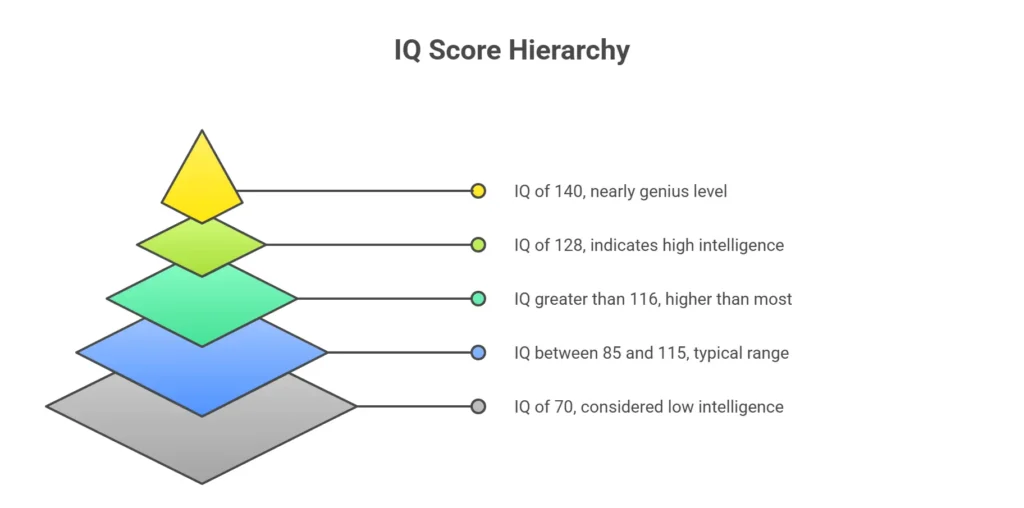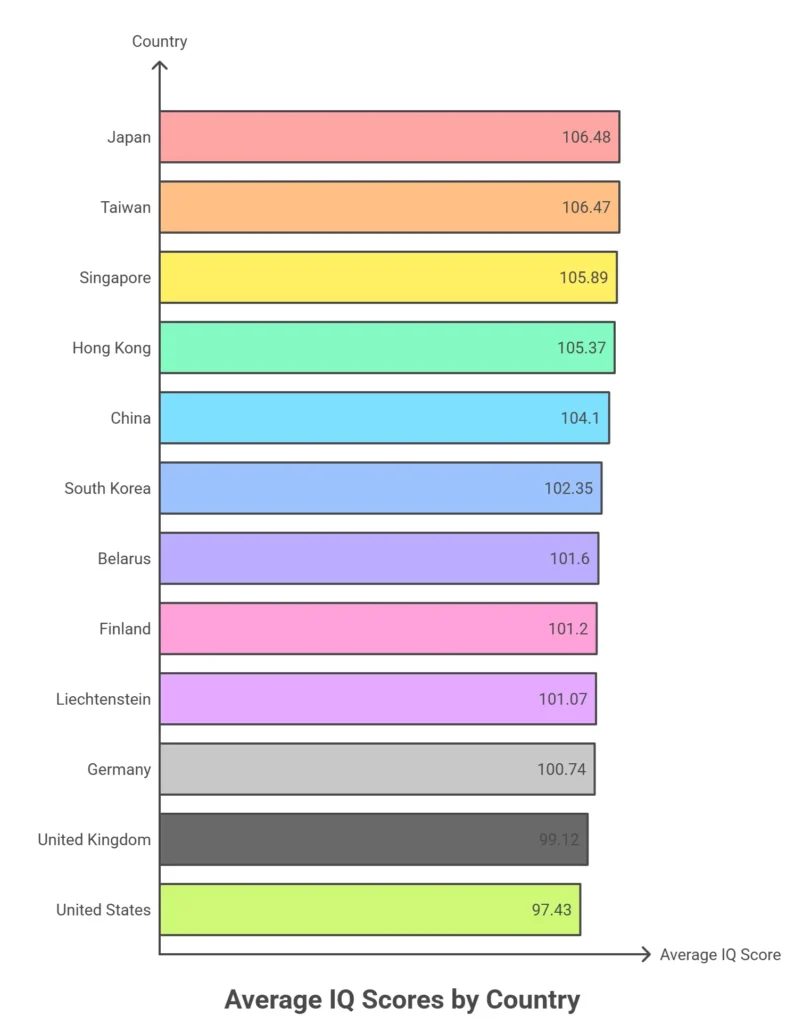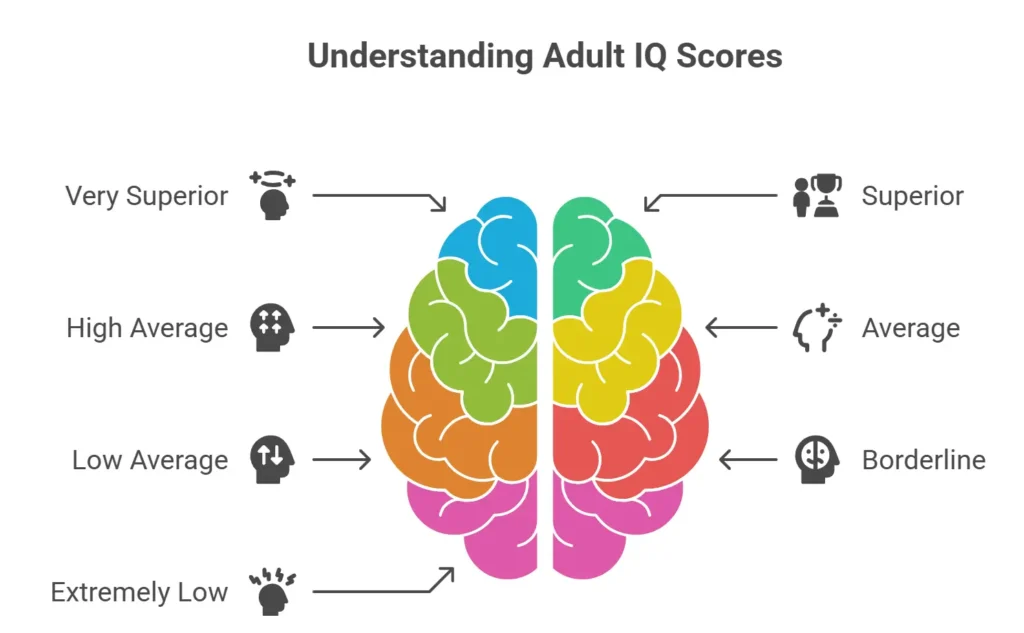
IQ score measures your reasoning ability. In short, it represents how you think logically, solve problems, and learn new information. An IQ test is required for many reasons, including educational placement, assessment of intellectual ability and evaluation of job candidates. Read on to understand what IQ actually means, what is the UK’s Average IQ Score and why does it matter. We will also explore the different types of IQ tests to calculate the average IQ level in the UK and learn how to improve IQ results.
Table of Contents
What is IQ and Does it Matter?
IQ stands for intelligent quotient, which expresses your relative intelligence. It’s the score determined by your performance on a standardised intelligence test or subtest compared to the average performance of others in your age group. So what does IQ really measure, and does it matter?
Your IQ test ranking helps determine how well you can use information and logic to answer questions or make predictions. It also determines how well you can solve puzzles and recall learned information. The test was created to identify students who need additional support in school. However, average IQ scores can vary across countries. Overall, it depends on a country’s educational system and financial health.
Mensa, the largest and oldest high-IQ society in the world states that intelligence is often confused with knowledge, wisdom and memory. Again, IQ is used to evaluate a person’s intellectual disabilities rather than overall intelligence.
What Does an IQ Test Measure?
Your IQ score determines how you stand in terms of mental ability. It measures intelligence based on your ability to reason, generate ideas and solve problems. The score is determined by giving the same test to a broad range of people from all socio-economic strata and then calculating the average. The average IQ test involves:
Verbal Reasoning
It tests your verbal agility, showing your ability to reasonably answer questions using concepts framed in words. Generally, a person with good verbal reasoning skills can effectively understand and generate ideas, communicate them with others and make informed decisions.
Perceptual Reasoning
It’s a cognitive ability that involves identifying visual information, spatial relationships, and patterns. The test includes activities like identifying changing patterns in images and constructing geometric designs.
Working Memory
Working memory is one of the core components of an IQ test. It involves identifying a person’s ability to process and manipulate visual or auditory information within a set time period. The test can help educators identify students’ ability to take in, retain, and quickly recall auditory and/or visual information.
Processing Speed
The test involves measuring the time for a person to understand and process new information. Students with high processing speed can respond quickly to cognitive and academic tasks.
What is the UK’s Average IQ Score and Why Does It Matter?
What is the average IQ in the UK? According to “The Intelligence of Nations – 2019” by Richard Lynn and David Bec, the national average IQ of the UK is 99.12. This average IQ score in UK is taken from many studies and measurements, including the Wechsler Intelligence Scale for Children-Revised (WISC-R), the Coloured Progressive Matrices (CPM), Raven’s Progressive Matrices and the Standard Progressive Matrices (SPM). The UK average IQ of 99.12 is the 20th highest in the world. Therefore, the country is considered one of the top intelligent nations globally.
An Intelligence Quotient (IQ) test is a standardised test which consists of a series of intelligence quotient test questions to determine human intelligence. The test is used to make decisions in multiple contexts, including school and college admissions, hiring opportunities, etc. An IQ below 70 is known as low, which indicates an intellectual problem. Again, an IQ of 140 or above is called an IQ score for genius. However, the IQ test average scores cannot promise life success for anyone. Many people with the highest IQ scores struggle in life, while those with average UK IQ scores or low IQ test scores flourish.
UK IQ Average Scores with an IQ Mean and Standard Deviation
According to test developers and diagnosticians, IQ tests are the most prevalent psychological tests to measure a person’s intellectual abilities and potential. Therefore, everyone needs to have a general idea of how is IQ measured and how to do an IQ test to find the average IQ UK score. There are many different IQ tests, including the free IQ test UK online, the free IQ test Reddit, the British IQ test Mensa, the standard IQ test and the Raven IQ test to determine your average IQ in UK.
So, what is the IQ of a normal person? An IQ between 85 and 115 should be considered a normal IQ level for an IQ standard deviation of 15%. The mean score is set to 100 points for many modern IQ tests to ensure a normal distribution of IQ scores.
What Is a Genius IQ Score on an IQ Scale?
Before understanding what is a genius IQ level, it’s important to note that human IQ is influenced by many factors. For instance, genetic and environmental factors as well as psychiatric conditions. Even though IQ tests are designed to assess intelligence, they are not enough to guarantee success or predict life outcomes.
What is an IQ of a genius? An IQ score of 140 indicates genius level IQ or nearly genius on IQ scales. Then what is a good IQ score UK? An IQ score greater than 116 is taken to be above average. So, is 120 a good IQ score? 120 IQ level is considered ‘above average or bright’ on the IQ scores scale. The average IQ on many intelligence tests is 100, with two-thirds of people having an IQ UK average scores between 85 and 115. Overall, an IQ of 70 is considered borderline intelligence, and a 128 IQ is superior.

Average IQ by Country: The IQ Chart for Different Countries
The avg IQ score is not the same in the world IQ chart. For instance, the average IQ in USA differs from the average UK IQ. Moreover, there are countries with high IQ and countries with the lowest IQ. Let’s look into the average IQ chart for different countries:
Japan 106.48
Taiwan 106.47
Singapore 105.89
Hong Kong 105.37
China 104.1
South Korea 102.35
Belarus 101.6
Finland 101.2
Liechtenstein 101.07
Germany 100.74
United Kingdom 99.12
United States 97.43

Average IQ by Age
Your average IQ level may change as you age. A person’s IQ remains stable throughout life compared to others of similar age groups, but diminished physical abilities can be one of the reasons for a lower average IQ UK by age. Learn more about your average IQ score by age:
What is the average IQ for a 12 year old?
The IQ scores of children at very young ages are less stable compared to IQ scores in adolescents and adults. A good IQ for a 12 year old ranges between 40 and 65.
What is the average IQ for a 13 year old
The average IQ in the UK for a 13 year old is same as that of a 12 year old. The average IQ test score ranges between 40 and 65.
What is the average IQ for a 14 year old?
The average IQ in the UK for a 14-year-old ranges between 60 and 80.
What is the average IQ for a 15 year old?
The average IQ for 15 year olds ranges between 70 and 90.
What is the average IQ for 16 year olds?
The average IQ for 16 year old females is between 70 and 90.
What is the average IQ of a 17-year-old female?
Now what is the average IQ score for a 17 year old? It ranges between 80 and 100.
What is the average IQ for 18 year old female?
The UK IQ average score for an 18 year old also ranges between 80 and 100.
What is the average IQ of a 20-year-old?
The average IQ for 20 year old is 99. Moreover, the average IQ for 20–24 year olds is slighly higher, around 100.
What is the average IQ for 24 year old female?
24 year old females have an average IQ of 100. However, 25 to 34 year olds have a slightly lower average IQ uk by age, which is 97.
What is the average IQ for a 40 year old?
The average IQ score UK for those between 35 and 44 is 101.
What is the average IQ score for a 45-year-old?
Those between 45 and 54 have an average IQ score of 106.
What is the average IQ scores range for a 55 year old?
The average IQ Score range for people between 55 to 64 years old is 109.
What is the average IQ level for a 65 year old?
People aged between 65 to 69 years have an IQ 114.
What is the average IQ for a 70 year old?
The average IQ test score for people between 70 and 74 years is 119.
IQ Test For Adults: Find the Average IQ for Adults
What is the average IQ test? The Wechsler Adult Intelligence Scale is one of the popular tests for finding IQ scores in adults. The fourth edition of the Wechsler Adult Intelligence Scale (WAIS-IV) is the gold standard in measuring intellectual performance. WAIS-IV has the given score range:
– 130 and higher: Very Superior
– 120 to 129: Superior
– 110 to 119: High Average
– 90 to 109: Average
– 80 to 89: Low Average
– 70 to 79: Borderline
– 69 and below: Extremely Low

IQ Test UK: How to Find Out Your IQ?
How do I find out my IQ? There are different ways to measure IQ. Some IQ tests are designed specially for children, while others are for measuring average adult IQ. Some of the IQ tests most commonly used today are as follows:
1. Stanford-Binet Test
Stanford binet tests are designed to assess developmental disabilities and exceptionalities in children. The Stanford Binet 5 provides a reliable evaluation of a child’s intellectual and cognitive abilities throughout the lifespan. They are used for clinical and neuropsychological assessments, psychoeducational evaluations for special education placements, and early childhood assessments. Overall, the Stanford-Binet intelligence test assesses five cognitive ability factors:
– Fluid reasoning
– Visual-spatial processing
– Quantitative reasoning
– Working memory
– Knowledge
2. Raven’s Progressive Matrices
Raven’s Progressive Matrices, also named Raven’s SPM, is another popular test for measuring IQ scores. This non-verbal test is considered a highly effective tool for determining a person’s problem-solving capabilities, observational skills and learning ability. During such assessments, the test-taker receives a single raw score rather than several marks based on various subtests. The test is taken by young children and adults. Basically, it’s a multiple-choice question test with the given objectives:
– Fluid intelligence
– Abstract reasoning
– Problem-solving
– Educational ability
3. Woodcock-Johnson Cognitive Ability Test
This test can measure verbal and nonverbal abilities in people of different age groups, from children of even 2 years old to people in their 90s. The test helps in assessing a range of cognitive functions, including:
– Academic achievement
– Scholastic aptitude
– Oral language
– Cognitive ability
4. The Wechsler Adult Intelligence Scale
The Wechsler Adult Intelligence Scale (WAIS) is an IQ test useful for clinicians to assess cognitive functioning in adults. Another version is the WISC-IV, which assesses intellectual functioning and academic potential in children. Here are the core factors that the Wechsler Adult Intelligence Scale examines:
– Processing speed index
– Perceptual reasoning index
– Working memory index
– Verbal comprehension index
5. Differential Ability Scales
This test measures different skills and abilities in children and adults. This test allows psychologists to determine a person’s strengths, weaknesses and cognitive abilities and predict educational outcomes. In addition, the test gives insights into how children of similar age groups process information.
Below are examples of some of the subtests for the Differential Ability Scales test:
– Object recall
– Digit recall
– Picture similarities
– Block-building

Education is no longer a one-time event; it's a lifelong journey. We provide expert guidance, personalised coaching and practice to boost your confidence. Take the next step in your career with the support and knowledge you need to succeed.
Potential Pitfalls of IQ Tests
IQ tests can’t predict your success in life. It’s just one measure of intelligence. Although it’s the best way to measure intelligence, IQ testing has many potential issues. For instance, IQ tests can incorrectly measure human intelligence which can cause issues like low self-confidence, unrealistic expectations and misconceptions of intelligence. Moreover, the focus of IQ tests is to measure a specific range of intellectual abilities. Therefore, it doesn’t assess a child’s creative or artistic abilities or social competence.
Conclusion
Your IQ score measures how far above or below you stand in mental ability relative to others in your age group. In this article, we have explained what is IQ and why are IQ tests important. In addition, we have discussed what is the UK’s Average IQ Score and why Does It Matter. We have also covered different IQ test uk for kids and adults and how IQ scores can be calculated correctly.
FAQs
IQ measures cognitive abilities, helping assess problem-solving, reasoning, and learning potential.
What’s the average IQ score in the UK? The average IQ in the UK is 99.12.
According to “The Intelligence of Nations – 2019” by Richard Lynn and David Bec, the average IQ in the UK is 99.12. Globally, it is the 20th highest.
Rory Bidwell, a 12-year-old, attained the highest IQ in the UK for his age group. He scored 162 on the Cattell III B test and became a Mensa member. Despite having no preparation for the Mensa test, he found the process quite straightforward.
Two of the most important uses of IQ tests are:
– Educational Placement: Identifying students’ strengths and weaknesses to provide appropriate learning support or advanced opportunities.
– Career and Job Suitability: Assessing cognitive abilities to match individuals with roles that align with their skills and potential.
The minimum IQ for Mensa is 132 on the Stanford-Binet scale.
The IQ of a genius is typically any score above 140.
On various IQ tests, a score of 100 is regarded as the average, with a standard deviation of 15. Additionally, around 68%, or two-thirds, of scores fall within one standard deviation from the average.
A genius-level IQ is frequently discussed. Though there is some disagreement among psychologists, a commonly accepted standard for genius IQ is any score above 140. This level of intelligence is rare, with only 2% of the population reaching it.
Japan ranks highest globally for average IQ, with a mean score of 106.48.
The ten countries with the highest average IQs are Japan, Taiwan, Singapore, Hong Kong, China, South Korea, Belarus, Finland, Liechtenstein, and Germany.
A UK-based survey shows that men tend to have a slightly higher IQ than women on average. The average IQ of UK males surpasses that of females by approximately 5 points.
In the UK, the average IQ is 99.12, while in the USA, it is 98. It is important to note that IQ tests are designed to average at 100, so minor variations are normal.
To achieve a Mensa level IQ, candidates must score at least 132 on the Stanford Binet Intelligence Scale, 148 on the Cattell, or 130 on the WISC IQ test.
Improving IQ test scores, including British IQ results, involves regular brain exercises like puzzles, memory games, and reading. Staying mentally active and adopting a healthy lifestyle can help boost average IQ test scores over time.










